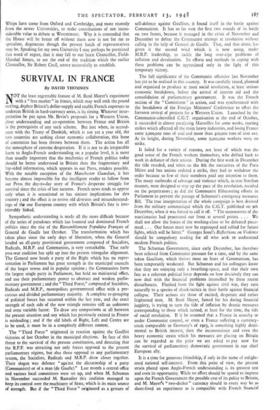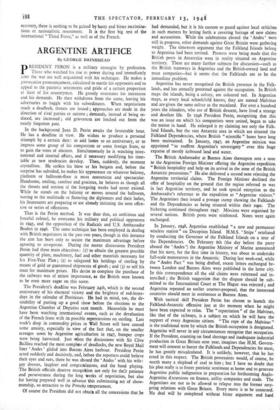SURVIVAL IN FRANCE
By DAVID THOMSON NOT the least regrettable feature of M. Rene Mayer's experiment with a "free market" in francs, which may well rock the pound sterling, deplete Britain's dollar-supply and enable French exporters to undercut British in hard-currency areas, is its timing. Whatever inter- pretation be put upon Mr. &yin's proposals for a Western Union, close understanding and co-operation between France and Britain is the prerequisite of any such scheme. But just when, in accord- ance with the Treaty of Dunkirk, which is not yet a year old, the two countries are seeking closer economic collaboration, this bone of contention has been thrown between them. The action has all the atmosphere of extreme desperation. If it is not to do irreparable harm to Anglo-French understanding on a popular level, it is more than usually important that the mechanics of French politics today should be better understood in Britain than the fragmentary and lop-sided information, which appears in our Press, renders possible. With the notable exception of the Manchester Guardian, it has become almost impossible for the intelligent reader to follow from our Press the day-to-day story -of France's desperate struggle for survival since the crisis of last autumn. French news tends to appear only when it is sensational or has sinister implications for this country ; and the effect is to revive old distrusts and misunderstand- ings of the one European country with which Britain's fate is irre- trievably linked.
Sympathetic understanding is made all the more difficult because of the series of paradoxes which has haunted and dominated French politics since the rise of the Rassemblernent Populaire Francais of General de Gaulle last October. The transformation which has taken place since the early days of liberation, when the General headed an all-party provisional government composed of Socialists, Radicals, M.R.P. and Communists, is very remarkable. That early post-war coalition has split up into the present triangular alignment. The General now heads a party of the Right which has no repre- sentation in Parliament but great strength in the municipal councils of the larger towns and in popular opinion ; the Communists form the largest single party in Parliament, but hold no ministerial office, and use their parliamentary power to obstruct and weaken parlia- mentary government ; and the "Third Force," composed of Socialists, Radicals and M.R.P., monopolises governmental office with a pre- carious and divided parliamentary majority. A complete re-grouping of political forces has occurred within the last year, and the exact strength of each side of the new triangle remains still an unknown and even variable factor. To draw any comparisons at all between the present situation and any which has previously existed in France is misleading ; and if the old labels of Right, Left and Centre are to be used, it must be in a completely different context.
The "Third Force" originated in reaction against the Gaullist victories of last October in the municipal elections. In face of this threat to the survival of the present constitution, and detecting that the R.P.F. was attracting not only forces opposed to the present parliamentary regime, but also those opposed to any parliamentary system, the Socialists, Radicals and M.R.P. drew closer together. Their slogan was defence "against the dictatorship of a party (Communists) or of a man (de Gaulle)." Last month a central office and various local committees were set up, and when M. Schuman in November succeeded M. Ramadier this coalition managed to keep its control over the machinery of State, which is its main source of strength. But if the "Third Force" originated as a gesture of self-defence against Gaullism, it found itself in the battle against Communism. It has so far won the first two rounds of its battle on two fronts, because it managed in the crisis of November and December to defeat the Communist attempt at revolution without calling in the help of General de Gaulle. That, and that alone, has given it the second wind which it is now using, under M.R.P. leadership, to tackle the long over-ripe problems of inflation and devaluation. Its efforts and methods in coping with these problems can be appreciated only in the light of this temporary victory.
The full significance of the Communist offensive last November has yet to be realised in this country. It was carefully timed, planned and organised to produce at most social revolution, at least serious economic breakdown, before the arrival of interim aid and the consolidation of parliamentary government. It was the French section of the " Cominform " in action, and was synchronised with the breakdown of the Foreign Ministers' Conference to offset the foreseen revival of projects for a Western Union. Launched by the Communist-cOntrolled C.G.T. organisation at the end of October, it succeeded in almost paralysing Marseilles for some weeks, starting strikes which affected all the main heavy industries, and losing France some 2,000,000 tons of coal and more than 4o0,000 tons of iron ore. At its height, during November, some 2,000,000 workers were on strike.
It failed for a variety of reasons, not least of which was the good sense of the French workers themselves, who drifted back to work in defiance of their unions. During the first week in December the tide receded, and when on the 8th the executives of the Paris Metro and bus unions ordered a strike, they had to withdraw the order because so few of their members paid any attention to them. The many outbreaks of sabotage and violence which, in true Sorelian manner, were designed to step up the pace of the revolution, recoiled on the perpetrators ; as did the Communist filibustering efforts in Parliament to prevent the passage of Schuman's emergency measures Bill. The true interpretation of the whole campaign is best derived from the military communiqué which the C.G.T. published on 9th December, when it was forced to call it off. "The manoeuvres of the reactionaries had penetrated our front at several points. . . . We shall not allow the forces of the working-class to be defeated piece- meal.. .. Our forces must now be regrouped and rallied for future fights, which will be bitter." Georges Sorel's Reflections on Violence should be compulsory reading for all who seek to understand modern French politics.
The Schuman Government, since early December, has therefore been relieved from Communist pressure for a time, and by the same token Gaullism, which thrives most on fears of Communism, has been temporarily weakened. But Schuman and his colleagues know that they are enjoying only a breathing-space, and that their own fate as a coherent political force depends on how decisively they can now deal with the financial problems intensified by these recent disturbances. Flushed from the fight against civil war, they turn naturally to a species of shock-tactics in their battle against financial collapse. Their actions are those of excited; desperate and rather frightened men. M. Rene Mayer, famed for his daring financial jugglery, is trying to turn the tide of inflation by drastic measures corresponding to those which turned, at least for the time, the tide of social revolution. If it be assumed that a France in anarchy or under Communist control, or even a France suffering a currency- crash comparable to Germany's of 5923, is something highly detri- mental to British interest, then the inconvenience and even the heavy economic strain which his measures are placing on Britain can be regarded as the price we are asked to pay now for the survival of parliamentary democratic government in our chief European ally.
It is a time for generous friendship, if only in the name of enlight- ened national self-interest. From this point of view, the present strain placed upon Anglo-French understanding is its greatest test and even its opportunity. While no effort should be spared to impress upon the French Government the possible cost of its policy to Britain, and M. Mayer's " two-decker " currency should in every way be as short-lived an experiment as is compatible with French financial recovery, there is nothing to be gained by hasty and bitter recrimina- tions or nationalistic resentment. It is the first big test of the international "Third Force," as well as of the French.



































 Previous page
Previous page